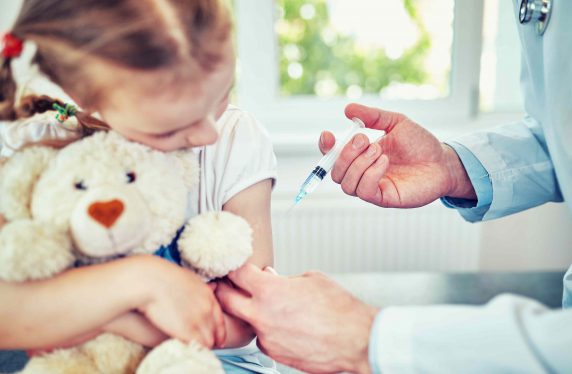The national GP immunisation programme could include more vaccines and incentives to help boost coverage, an NHS review has suggested.
In its interim vaccinations and immunisations review, NHS England said the range of the vaccines included in the current contractual arrangements should be broadened to support uptake.
It concluded that the current targets were ‘misaligned’ to the levels of coverage required for population protection.
It comes after official figures revealed that coverage for all 13 childhood vaccinations in England, including for the MMR vaccine, fell for the fifth consecutive year.
NHS England’s advisory group looked at existing GP payment and incentive structures – implemented in the 2004 GMS contract – to see whether changes could be made to improve vaccination delivery and coverage.
The group found that offering additional incentives to practices could entice GPs to meet targets and achieve ‘optimal coverage’.
The review said: ‘Simplify payment structures wherever possible and align payment mechanisms with their intended impact. We consider there should continue to be three types of payment: a capitation payment to encompass provision of the necessary infrastructure to deliver the vaccinations and immunisations services; an item of service payment should reward actual delivery of vaccinations and immunisations; and incentives could provide an additional impetus to achieve optimal coverage of specified vaccines.
‘However, the blend of these three payment types should be adjusted. In particular, for MMR there was a case for greater weight on item-of-service payments.’
Under existing contractual arrangements, GPs are offered incentives for three childhood vaccines – MMR, meningitis C and diphtheria, tetanus, poliomyelitis, pertussis and Haemophilus influenza type B – alongside flu vaccination for four at-risk groups.
NHS England said the incentive system is ‘outdated’, arguing that including more vaccines in the national programme could help promote increased coverage.
It said: ‘The current childhood incentive scheme was felt to be outdated because the current coverage targets (set at 70% and 90% coverage) are misaligned to the levels of coverage required for population protection. It was felt the current “cliff edge” incentive design does not always support improvement and there are understandably areas that could be improved.
‘Consider broadening the range of vaccines included in any incentive scheme to support uptake. At present incentives to support practices to achieve optimal coverage are limited to three childhood vaccines through the Childhood Immunisation Target DES and seasonal influenza immunisation for four ‘at-risk’ groups in the Quality and Outcomes Framework. There may be relative benefits of a focus on other vaccines to promote improved coverage.’
BMA GP Committee chair Dr Richard Vautrey said: ‘Vaccination is a vital tool in preventing illness and suffering, especially among children. GPs and their teams are already working hard to ensure that all patients who need vaccinations receive them, but we do recognise that more must be done to reverse the falling uptake rates, and protect as many people as possible.
‘While much of this is about reliable, trustworthy information, we must also look at present systems to ensure they are reliable, convenient and straightforward for patients and practices.
‘We look forward to discussing further some of the ideas in this report with NHS England in the near future.’
NHS England said the recommendations will be ‘taken into account’ during contract negotiations with the BMA, with any changes to be implemented from April 2020 onwards.
Public Health England has advised GP practices to ‘only order vaccine needed for the forthcoming week and to avoid stockpiling’ following the delays to the flu nasal vaccine supply.
For advice on how to improve uptake at your own practice with all the routine and catch-up immunisation campaigns, check out the personalised income tools and guidance available on Pulse Intelligence – our new platform designed to help run your practice efficiently, maximise your profits and simplify the GP contract. Sign up for your 30-day free trial: https://pulse-intelligence.co.uk/
Pulse October survey
Take our July 2025 survey to potentially win £1.000 worth of tokens












